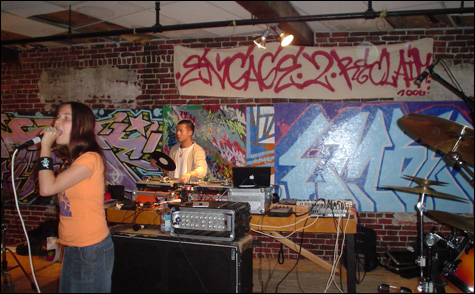
SAYLOVE SPEAKS OUT: League events mix music, art, + politics. |
A hip-hop artist will perform in the halls of the State House on April 4. Perhaps that’s all that needs to be said to explain what lawmakers will experience when the League of Young Voters heads to Augusta to receive the traditionally staid honors with which state government rewards public-interest achievements.
Yes, the League is getting their very own day at the State House — a building League state director Justin Alfond regularly refers to as “our house” — including a proclamation from the governor and laudatory resolutions passed by the House and the Senate. It’s the sort of honor that Alfond and his fellow Leaguers seriously considered before deciding to accept — weighing whether it would be too legit, too mainstream, just too downright stuffy to mean much to a group of civic-minded 20-somethings and 30-somethings who really just want political power for themselves.

The group, formed in early 2004 (just in time to really hit its stride in the ’06 election), is a hybrid political-action group. They mix national political idealism with local activism — taking people who are upset at the direction the country is going and turning their energy to making reforms at the local- and state-government levels. They combine grassroots-style door-to-door campaigning (just like old-time politicians) with software that tracks who reads their e-mail messages and Web postings (just like multinational marketing companies). They get young people out for an evening of hip-hop, spoken-word acts, and art exhibits, and mix in some politics to produce what may be the truest representation of a “political party.” And they cross traditional lines between what activists call “education” (teaching people about the democratic process and informing voters about candidates) and outright advocacy (picking issues behind which to throw their youthful backing).
What the League learns here, and in five other pioneer League states (California, New Mexico, Ohio, Pennsylvania, and Wisconsin), will be applied nationally in the coming years, says national organizing and training director Rob “Biko” Baker. The League is working toward a national political takeover, saying on its Web site, “We want a progressive governing majority in our lifetime.”
Data mining
The League’s ability to develop that depends in part on their capacity to motivate people to participate, often using art or music to draw people in.
The Portland League has fit in very well with the city’s hip-hop scene, says SayLove, a hip-hop artist who helps to organize League events. “Hip-hop has always been a social-political movement,” she says, noting its beginnings in efforts to divert inner-city young people from gangs and into more productive, creative activities.
“You really have to find a unique way of grabbing someone’s attention,” says 29-year-old Portland city councilor Dave Marshall. He used his paintings to great effect in his own election bid, setting up a display in Monument Square with both art and campaign information, attracting people with his art, and then engaging them in a political discussion.
But the real muscle behind League efforts is provided by a technology-driven campaign that allows grassroots activity to be measured, quantified, trialed, and refined over time.
As progressive political organizations strive to measure their effectiveness (useful for getting grants from foundations, which are increasingly looking for detailed results of funded projects), they are having to find ways to differentiate themselves from spam e-mails, from the deluge of text messages and cell-phone voicemails, from unsolicited MySpace messages, and from any number of other intrusions attempting to grab young people’s attention. The League is no exception, and indeed is leading the effort in Maine politics.
The systems they use are similar to those commonly applied in corporate public-relations campaigns, which can determine how many people receive an e-mail message, how many actually read it, how many of them follow a link in that message, and how people move around an organization’s Web site.
The measurements aren’t static. With each new e-mail message, each new posting on the Web site, each tweak of a message or page’s design, the results change, letting League organizers constantly fine-tune not only their messages, but also the messages’ presentation, to get maximum attention from as large a group of people as possible.
One recent e-mail, for example, asked in its subject line, if readers were “down with OPP?” — both a reference to League pet project Opportunity Maine (a student-loan-payment tax-credit initiative) and to a 1991 rap song by Naughty By Nature whose refrain asks whether a listener is willing to cheat on his or her lover. The tone and brief content of that message put off Jeff Ferland, a 22-year-old who ran for the Maine House as a Republican last year but ended up withdrawing from the race and endorsing a Green Independent opponent. (Ferland says he may run again, but most likely as a Green.) He says messages like that make it “hard to take them seriously.”
But while it was an honest attempt to convey information to League members, it was really just another trial balloon — if not enough people read it or responded to it, the League will adapt, again.